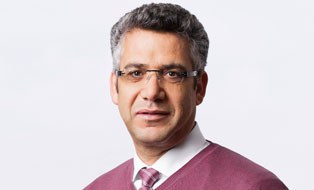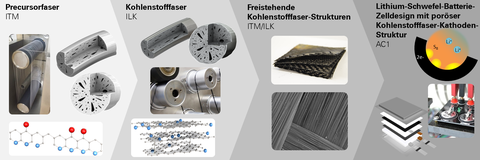e-Carbon
In light of global megatrends such as the scarcity of natural resources and an increasingly individualized way of life, energy storage and lightweight engineering are key technologies in the field of innovative mobility concepts. The sustainable use of new materials with a high functional density, for which carbon fibres have enormous potential, plays a particularly important role in the development of new high-tech products in these sectors in Saxony.
Scientists at TU Dresden (TUD) have succeeded in setting up an interdisciplinary junior research group "e-Carbon" (ESF-SAB 100310387), consisting of chemists, textile and plastics engineers, which will jointly develop tailor-made and multifunctional carbon fibres for the storage of high energy densities over the next three years, starting on 1 July 2017. This promising project was selected by the TU Dresden and the Sächsische Aufbaubank SAB-ESF from more than 40 applications as a trend-setting project.
The complex topic will be dealt with by young scientists from the TUD's Institute for Lightweight Engineering and Polymer Technology (ILK), the Institute for Textile Machinery and High Performance Materials Technology (ITM), and the Chair of Anorganic Chemistry I (AC1). The interdisciplinary orientation of the consortium creates the best conditions with a worldwide unique position for intensive scientific and industrial networking of junior researchers in new fields of research with high practical relevance on a regional, national and international level. The main focus is on the qualification and further training of specialists for the Saxon labour market as well as on the spin-off of start-ups and the assumption of entrepreneurial responsibility in the high-tech sector.
With the new carbon fibres, not only can stiffness and strength be significantly increased, but the structure can also be specifically adjusted for other functions. With their large inner surface, which is not yet accessible, the carbon fibres offer enormous potential for energy storage systems, which will be the focus of the junior research group in the future. This is mainly made possible by a cross-scale interconnecting pore system, i.e. by means of continuously cross-linked cavities of defined size in the fibers. An important advantage of extended energy storage is that the mechanical properties of the conventional carbon fibers are not affected and the carbon fibers act both as an active material and a current conductor.
Within different research focuses of the junior research group, energy storage systems based on lithium-sulphur batteries with high energy density will be applied and perspective concepts for the transfer of the knowledge gained in the field of flexible double layer capacitors with fast energy storage will be developed. The results of the junior research group will be used to achieve an industrial breakthrough in battery technology and electromobility.
 © Christian Hüller
© Christian Hüller
Founder and director of the RCCF
NameProf. Dr.-Ing. habil. Dipl.-Wirt. Ing. Chokri Cherif
Send encrypted email via the SecureMail portal (for TUD external users only).
